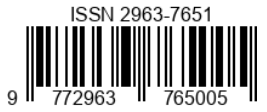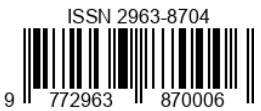Persepsi Mahasiswa Fakultas Hukum Universitas Nusa Cendana Terhadap Penghinaan Citra Tubuh (Body Shaming) di Lingkungan Kampus dan Media Sosial
DOI:
https://doi.org/10.55606/jhpis.v3i3.3893Keywords:
Perception, Campus Environment, Social Media, Body ShamingAbstract
The purpose of this study is to analyze the perceptions of students of the Faculty of Law, Nusa Cendana University about body shaming in the campus environment and social media and how the regulation of criminal acts of body shaming in review of the Criminal Code and Laws outside the Criminal Code. This research method is an empirical juridical approach, namely research whose data is obtained through efforts to investigate existing realities in social life. The results of this study are that the perceptions of students are very diverse, most students know about body shaming, many students have been victims of body shaming, and some are often the perpetrators of body shaming. The acts of body shaming that are experienced form the thoughts of some students to fight back but more choose to remain silent. This thought causes a response where some students choose to shut down and close themselves, some become insecure and others choose to withdraw from their social environment. According to most students, body shaming is a dangerous thing. The regulation of the criminal offense of body shaming in terms of the Criminal Code, the relevant article is Article 315 of the Criminal Code and if it is reviewed from laws outside the Criminal Code, the relevant articles are Article 27 Paragraph (3) of the ITE Law, Article 5 of the TPKS Law and Permendikbud Ristek No.30 of 2021.
Downloads
References
Andi Hamzah. (2015). Delik-delik Tertentu di dalam KUHP. Jakarta: Sinar Grafika.
Antama, F., Zudhy, M., & Purwanto, H. (2020). Faktor Penyebab Cyberbullying yang Dilakukan Oleh Remaja Di Kota Yogyakarta. Jurnal Penegakan Hukum dan Keadilan, 1(2).
Arief Mansur & Elisatris Gultom. (2005). Cyber Law-Aspek Hukum Teknologi Informasi. Bandung: Refika aditama.
Aryani, F., & Bakthiar, M. I. (2018). Pengaruh Pelatihan Asertif Terhadap Perilaku Cyberbullying pada Siswa. Jurnal Konselor, 7.
Budi Suhariyanto. (2012). Tindak Pidana Teknologi Informasi (Cybercrime). Jakarta: Raja Grafindo Persada.
Charani, Lisya. (2018). Body Shame Dan Gangguan Makan Kajian Meta- Analisis. Jurnal Ilmiah Buletin Psikologi, 26.
Chomet, N. (2018). Coping with Body Shaming. New York: The Rosen Publishing Group, Inc.
David I. Baindrige. (2003). Komputer dan Hukum. Jakarta: PT. Sinar Grafika.
Eddy O.S. Hiariej. (2016). Prinsip-prinsip Hukum Pidana. Yogyakarta: Cahya Atma Pustaka.
Heather Nicole Hines. (2011). Penindasan Tradisional dan Penindasan Siber: Apakah Dampaknya Terhadap Konsep Diri? (Thesis, Western Carolina University).
Hinduja, S., & Patchin, J. W. (2014). Cyberbullying: Identification, Prevention & Reponse. Cyberbullying Research Center.
Iskandar. (2009). Metodologi Penelitian Kualitatif. Jakarta: Gaung Persada.
Kitab Undang-Undang Hukum Pidana.
Kowalski, R. M., Limber, S. P., & Agatston, P. W. (2008). Cyberbullying. UK: Blackwell Publishing Ltd.
Marden, N. E. (2010). Exposing the Cyberbully.
Permendikbud Ristek Nomor 30 Tahun 2021 Tentang Pencegahan dan Penanganan Kekerasan Seksual di Lingkungan Perguruan Tinggi.
R. Soesilo. (1996). Kitab Undang-Undang Hukum Pidana (KUHP) Serta Komentar Komentarnya Lengkap Pasal Demi Pasal. Bogor: Politenia.
Soekanto. (1982). Pengantar Penelitian Hukum. Jakarta: UI Press.
Syah, R., & Hermawati, I. (2018). Upaya Pencagahan Kasus Cyberbullying bagi Remaja Pengguna Media Sosial di Indonesia. Jurnal Penelitian Kesejahteraan Sosial, 17(2).
Triatoro, S., Fatwa, T., & Hadi, S. (2016). Cyberbullying, Cybervictim, dan Pengampunan di kalangan SMA di Indonesia. The Turkish Online Journal of Education Technology.
Undang-Undang Nomor 11 tahun 2008 Tentang Informasi Dan Transaksi Elektronik Lembar Negara Republik Indonesia Tahun 2008 Nomor 58.
Undang-Undang Nomor 12 Tahun 2022 Tentang Tindak Pidana Kekerasan Seksual.
Undang-Undang Nomor 19 Tahun 2016 Tentang Perubahan atas Undang- Undang Nomor 11 Tahun 2008 Tentang Informasi Dan Transaksi Elektronik Tambahan Lembara Negara Republik Indonesia Nomor 5962.
Willard, N. (2005). Cyberbullying and Cyberhreats. Washington: U.S. Department of Education.
Willard, N. (2007). Cyberbullying: Q & A with Nancy Willard. The Prevention Researcher, 14(5).
Willard, N., & Amalia Setianingrum. Pengaruh Empati, Self Control, dan Self- Esteem Terhadap Perilaku Cyberbullying.
Zainudin Ali. (2009). Metode Penelitian Hukum. Jakarta: Sinar Grafika.
Downloads
Published
How to Cite
Issue
Section
License
Copyright (c) 2024 JURNAL HUKUM, POLITIK DAN ILMU SOSIAL

This work is licensed under a Creative Commons Attribution-ShareAlike 4.0 International License.

















